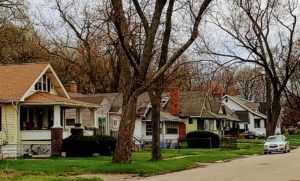By Tom Travis
A passel of young people from across Flint attended the last city council committee meeting to show their support and rally the council to approve the new proposed zoning ordinance. The new ordinance is expected to be on the council’s agenda the first week of May.
In a nearly unanimous council response each council member chimed in agreeing that the city needs updated zoning codes.
One of the many public speakers, Travis Gilbert declared, “One of the most effective ways we can move our city forward would be to pass the new zoning ordinance.”

Public speakers waiting to call for support of a new zoning ordinance at Wednesday’s council committee meeting. (Photo by Tom Travis)
If approved by the council, the City of Flint indeed will soon have a new zoning ordinance. The present zoning ordinance was adopted in 1963 and hasn’t been updated since 1974.
One public speaker described how zoning laws personally affected his life
Cade Surface, a Fifth Ward resident, described his past living situations: renting a duplex, renting an apartment, sharing a house with others and renting a room in a large house. Before that, he said, “I lived in my car.” Surface now owns a home in the historic Carriage Town Neighborhood.
“I needed this neighborhood in order to build the kind of life I have now. And I truly give credit to the supportive nature of Carriage Town to be able to have a life that I didn’t know I could have 10, 15 years ago.
“But beyond just places to live I have also had a neighborhood that allows me to walk to a park, to walk to work. I’ve been able to walk to school, to get groceries, to get coffee and see my neighbors, to go to the hospital to vote. I’ve only been able to do this because the laws that govern the use of the land allow for the diversity of uses and allow for a place that really nourishes a person,” Surface said.
Surface said that he considers himself “lucky” that he can live in the kind of neighborhood he described. “You all know that there used to be dozens of neighborhoods in Flint that allowed for the type of life I just described. But unfortunately a lot of those neighborhoods were wiped out based on the 1974 zoning codes that are currently rule the land.
“We know that those codes are based off the prejudices and trends of the 1950s and 1960s — trends that certainly were not considering everybody in our community. And were not considering the realities of our communities today. The draft code that is before us is not perfect, but it is far better than what we’re living with now.”
Wilcox outlines proposed zoning ordinance
In last Wednesday’s city council committee meeting Planning and Development Director, Suzanne Wilcox, along with several of her staff, presented to the city council the key components to the new zoning law and the importance of up to date zoning laws. A PowerPoint version of the new zoning law presentation can be viewed here:
“The zoning ordinance is the last piece of the master plan that has not yet been implemented,” Wilcox said.
“The Master Plan is a community vision in a 20-year period,” she said. “It was adopted unanimously in 2013 by the city council. State law requires municipalities to have a Master Plan. It lays the ground work for future development. It sets land use guides too; the planning commission is responsible for developing it and the city council adopts it, explained Wilcox.

Director of Planning and Development, Suzanne Wilcox, speaking to city council, from a 2019 meeting. (Photo by Tom Travis)
“Getting a zoning code adopted will give the city a land use plan that reflects the Master Plan,” she said. “Right now they are not in congruence, so right now we are operating under a Master Plan with a completely different zoning code that does not reflect the city of Flint,” Wilcox told the council.
What is a Zoning Code?
Zoning ordinances are regulations that determine how a parcel of land can be used and what it can be used for. The primary purpose for zoning codes is to protect the health, safety and welfare of residents, Wilcox explained.

A north end Flint neighborhood off Martin Luther King Jr. Blvd. (Photo by Tom Travis)
It is meant to create stability within the districts, so that each district allows for a predictable range of uses and building types. Zoning Ordinances are the primary method by which the Master Plan is implemented, according the city’s planning and development website.
Updated zoning ordinance comes from planning sessions held in 2013
Wilcox explained, “In the planning sessions held in 2013, what was overwhelmingly heard from residents is they want ‘a sense of place’ in their neighborhoods. For each neighborhood in the city of Flint there will be a place to shop, to work, live, enjoy recreation — that was the basis used to design the new place based map. The new zoning ordinance puts into place what the residents have said they want to see in their neighborhoods.”
Entrepreneurs, real estate developers, young business owners and housing professionals appear before council
A group of young adults filled the public speaking time during a recent city council committee meeting. They all called for the council to approve the newly proposed zoning ordinance.
Joel Arnold, a Seventh Ward resident, said, “It’s been five years since the planning commission sent it to council and today we’re still working under land use laws from 1974. A lot of times what happens is that when people want to come and invest in our city and invest in our neighborhoods and they request zoning changes they have to come before you [the city council] which takes time and resources and often those folks will just go somewhere else. We want those investments in our city.
“This zoning ordinance is an opportunity for us to see investments whether it’s new homes, green neighborhoods, traditional neighborhoods, mixed neighborhoods, new businesses on each side of our city. This is a real opportunity for us to update our laws get a zoning ordinance that reflects with the residents of today.”
Sarah Scheitler, a Seventh Ward resident employed by the Flint River Watershed Coalition, said, “The FRWC was involved in the proposed zoning code especially in regard to water quality content. Prior developments in our city have caused significant pollution in our waterways, in air quality and contamination in our soils.

The Flint River running out of downtown Flint past the historic Carriage Town Neighborhood and Water Street walking bridge. (Photo by Tom Travis)
“All of these have negatively impacted our public health. This was allowed to happen, in part, because of a lack of environmental protections in our current zoning code,” Scheitler contended. “If implemented, the updated code will ensure our waterways, soils and air experience no further degradation from new development or industry. This code will bring Flint into the twenty-first century and build a healthier, more sustainable city.
Moses Timlin, a Seventh ward resident said, “No zoning code is ever perfect. But what good zoning codes do is that they allow housing and buildings of all types and they make the development process shorter and more transparent. And I believe the update to the zoning code will accomplish those things.
“When you look at zoning it can become very ambiguous,” Timlin said. “Sometimes people don’t even know what you’re talking about. But what zoning does do is that it dictates how land can be developed or redeveloped.
“In looking at zoning and how it can effect cost and quality of housing this is a very critical time to look at zoning and how it can help shorten development processes, how it can empower staff that are already at low-capacity to do things administratively.
“COVID has seen cost increases across the board making new development very difficult zoning can actually be a part of helping eliminate some of those costs that developers face,” Timlin concluded.
Kristin Stevenson, a Fourth Ward resident, reading her comments from her phone, explained to the council that a zoning code is, “meant to help keep a city’s character as it changes or grows and to be updated as time goes on. The character of this city is much different than the character of 1974, when the current code was adopted. We need a code that fits the character of Flint of the twenty-first century.”
Emily Doerr, a Fifth Ward resident said, “I’m not a planner but I am in real estate development, an entrepreneur, and opening a business in Flint. I’m here to say zoning matters. It makes it harder to open a business when you want the business to operate in a building that is but this current zoning code requires 10 or 15 parking spots and you know that the nine parking spots that will fit is enough but that would actually add so much more cost. And we need to have entrepreneurs open businesses in our city and I know all of you want that.” Doerr added, “Across the city, not just downtown.”
Referring to her “day job” as a real estate developer, Doerr said, “We need to make sure that people that want to buy homes here but maybe don’t want a single family home but they want row home, a town home, maybe a “tiny home.” Maybe they want to be a home owner.

EVM file photo from the east side of Flint. (Photo by Tom Travis)
“Flint is a city of builders,” Doerr asserted. “We’ve always allowed for people in Flint to build things. That’s actually our strength. My parents were raised here. I grew up here. We build things here. We need to let our home owners build accessory dwelling units above their garages if they want to rent to a tenant to be able to make money.”
Travis Gilbert, a Fifth Ward resident said, “I’m here to show my support for the new zoning ordinance. [The 1974 zoning ordinance] was made at a time when Flint and the United States looked very different than from what it does today and today we have different needs. I don’t believe that [the 1974 zoning code] is no longer serving our community very well.

“I think one of the most effective ways we can move our city forward would be to pass the new zoning ordinance,” Gilbert added. “A lot of new business, a lot of new start-ups that would like to move into neighborhoods have to jump through hoops in order to have to actually start their business. This discourages people from actually making investments in Flint and further slows down our economy.”
Derek Dorhman, a Fifth Ward resident, said, “I’m here to support the new zoning ordinance and it’s my hope that you will too. It’s long over due and it will help set Flint on a path for success. It will allow for more flexibility and growth it will also help remove barriers for those who want to invest in their city.”
EVM Managing Editor Tom Travis can be reached at tomntravis@gmail.com


You must be logged in to post a comment.